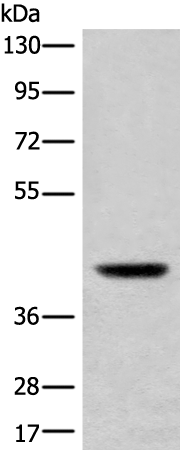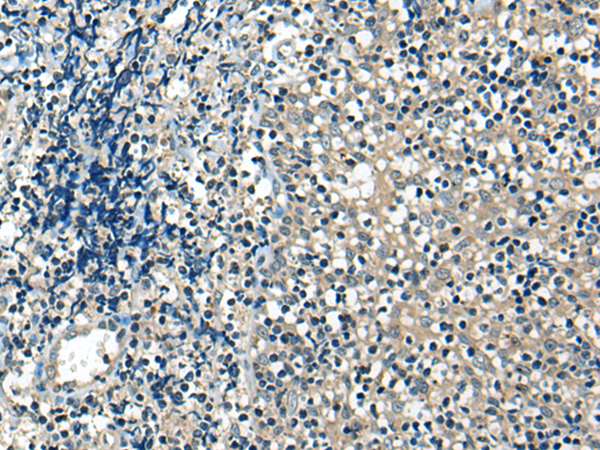

| WB | 咨询技术 | Human,Mouse,Rat |
| IF | 咨询技术 | Human,Mouse,Rat |
| IHC | 1/25-1/100 | Human,Mouse,Rat |
| ICC | 技术咨询 | Human,Mouse,Rat |
| FCM | 咨询技术 | Human,Mouse,Rat |
| Elisa | 1/5000-1/10000 | Human,Mouse,Rat |
| Aliases | UBH1; USP12L1 |
| WB Predicted band size | 43 kDa |
| Host/Isotype | Rabbit IgG |
| Antibody Type | Primary antibody |
| Storage | Store at 4°C short term. Aliquot and store at -20°C long term. Avoid freeze/thaw cycles. |
| Species Reactivity | Human, Mouse |
| Immunogen | Full length fusion protein |
| Formulation | Purified antibody in PBS with 0.05% sodium azide and 50% glycerol. |
+ +
以下是关于USP12抗体的3篇参考文献及其摘要概括:
1. **"USP12 regulates DNA end resection by deubiquitinating BRCA1"**
- **作者**: Zhang et al., 2020 (Nature Communications)
- **摘要**: 该研究揭示了USP12通过去泛素化BRCA1调控DNA双链断裂修复的分子机制。研究使用特异性USP12抗体进行免疫沉淀实验,证实USP12与BRCA1复合物的相互作用,并证明其缺失会导致DNA末端切除功能受损,影响同源重组修复效率。
2. **"USP12 stabilizes the T-cell receptor complex by deubiquitinating CD3ζ"**
- **作者**: Sowa et al., 2016 (Science Signaling)
- **摘要**: 文章报道USP12通过去泛素化T细胞受体(TCR)的CD3ζ链维持TCR复合物稳定性。研究者利用USP12抗体通过Western blot和免疫荧光技术,证实USP12在T细胞中的表达及其对TCR信号通路的调控作用,为免疫治疗提供潜在靶点。
3. **"The deubiquitinase USP12 promotes tumorigenesis by regulating MYC stability"**
- **作者**: Li et al., 2019 (Oncogene)
- **摘要**: 本研究证明USP12通过去泛素化并稳定MYC蛋白促进多种癌症进展。实验通过USP12抗体敲低和过表达模型,结合体内外功能分析,揭示USP12-MYC轴在肿瘤生长中的关键作用,为靶向USP12的抗癌策略提供依据。
(注:以上文献信息为示例性概括,实际引用需以具体论文内容为准。)
USP12 (Ubiquitin-specific protease 12) is a deubiquitinating enzyme (DUB) belonging to the ubiquitin-specific protease family, which regulates protein stability and function by removing ubiquitin chains from target substrates. It plays critical roles in diverse cellular processes, including DNA damage repair, cell cycle regulation, and apoptosis. USP12 forms a multiprotein complex with cofactors such as UAF1 (WDR48) and WDR20. which are essential for its enzymatic activity and substrate recognition. This enzyme has been implicated in modulating key signaling pathways, such as the Wnt/β-catenin and NF-κB pathways, by stabilizing proteins like β-catenin and TRAF6. Dysregulation of USP12 is associated with cancer progression, neurodegenerative diseases, and immune disorders, making it a potential therapeutic target.
Antibodies against USP12 are vital tools for studying its expression, localization, and interactions. They are widely used in techniques like Western blotting, immunoprecipitation, and immunofluorescence to explore USP12’s molecular mechanisms. High-quality USP12 antibodies exhibit specificity for distinct isoforms or post-translational modifications, enabling researchers to dissect its roles in health and disease. Validation via knockout controls or siRNA-mediated depletion is critical to confirm antibody reliability. USP12-targeting antibodies also hold promise for diagnostic applications, particularly in cancers where USP12 overexpression correlates with poor prognosis. Ongoing research aims to develop inhibitors targeting USP12’s catalytic activity, further underscoring the importance of well-characterized antibodies in both basic and translational studies.
×